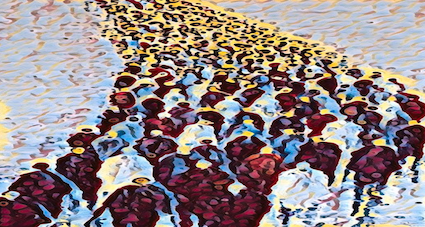When the Nazi Extermination camps were finally liberated, the Allied Forces rounded up the neighbouring villagers and forced them to take a tour, because the said neighbours claimed they were unaware.
25-30 years later, I sailed to and from East and West Germany, Poland, Black Sea (Ukraine/USSR/Romania) and heard so many versions of the same, sailed with elderly Germans who would open up after a few drinks.
The loudest about what happened were the Romani People, also known as Gypsies or Banjaras, who somehow shared a natural affinity with us Indians when we were in and around East and West Europe. Some of the costume jewellery that we took along to trade or the handicraft prints we wore were exactly the same as what they used and that was usually the first point of inter-action.
From the Romani Gypsies I met in the Romanian seaports of Constanza and Galatz, I learnt about how nobody even bothered to document how many Gypsies were sent to the extermination camps. From the Polish and East German pilots as well as the West German Kiel Canal and Elbe pilots, I learnt about how absolutely nobody was guilty for the genocide. From the German Officers I sailed with, I saw how they cried after a few drinks, about all that had happened in those days – and then I heard them too.
Old people live with the ghosts of their pasts, who often over-ride the happier memories, especially if work brings them face to face with reminders. Sailing to or from Suez, the sheer presence of Israel and all that it stands for, could not be ignored – and was and still is a huge reminder.
Do we have a single reminder about the Kashmir Genocide? With great difficulty and after many decades, we finally have a War Memorial in Delhi, we have a Partition Memorial in Amritsar, otherwise all we have is a collection of stones and bones of Mughals and European Colonials. Our memory has been stolen by these two sets of robbers – thanks to their cohorts left behind.
Collective loss of memory is also about not being able to accept hard and unpalatable facts. The usual “be positive” and “don’t be so negative” taunts are one part. The bigger part is that there is value in shutting your eyes and minds. Think of all those who benefitted by the genocide of Kashmiri Pandits?
For those who supplied transport to exit
For those who supplied the guns and bullets
For those who made the maps pointing out who lived where
For those who grabbed the land
For those who stole the possessions
For those who ran the shops nearby
For those who stole the bijli
For those whose child got a place in school “in lieu”
For those who plucked the fruit from their trees
For those who re-built the document trail
For those who rented space at destination
For those who fiddled with the bank accounts
For those who took the toys
For those who sold the vintage and antique items
For those who burnt the wood when it was cold
For those who were given the transport permits
For those who changed the temples to whatever else
For those who grabbed the floating hotels
For those who supplied the forces
For those who played chess with lives
For those who got benefits when their family members perished (Note-that included the family members of the “bad guys” too)
For those who worked as morticians, morgue attendants, and the rest of it
For the hospitals and doctors and medics and ambulance drivers
All these, and more, in Kashmir and all the way to Delhi and beyond. After all, whilst the Kashmiri Pandits were being finished, the strongest lobby of babus in Delhi was which community?
Genocide was always business. There was an economic reason behind genocide and the trickle down was a fact too. And so was the collective loss of memory.
As a first-generation zero-restart Partition refugee offspring, I knew and know this subject first-hand – the possible big difference then being that many many young men and boys were exterminated in that episode.
I have not seen KASHMIR FILES (the movie) as yet. But I have lived KASHMIR. From Corp Commanders to Officers commanding their Regiments to Officers Commanding Air Force Stations and Squadrons, down to rookie 3-star and more. I grew up listening to Partition episodes, and then after 1990, to Kashmir episodes. Including Major Abhimanyu Sikka, my first cousin, about whom Dilip D’Souza wrote so well.
There are names of family and friends at the National War Memorial – each one of them as well as others who survived, have their own versions of the KASHMIR FILES.
And this is the story of one of them who came from Nagaland Angami and Punjabi Refugee stock to try to stop the genocide in Kashmir. Abhimanyu, my younger cousin, assembler of model planes and ships. Gentle strong soldier, good with weapons and books, as well as cricket bat.
(Veeresh Malik was a seafarer. And a lot more besides. A decade in facial biometrics, which took him into the world of finance, gaming, preventive defence and money laundering before the subliminal mind management technology blew his brains out. His romance with the media endures since 1994, duly responded by Outlook, among others.)


